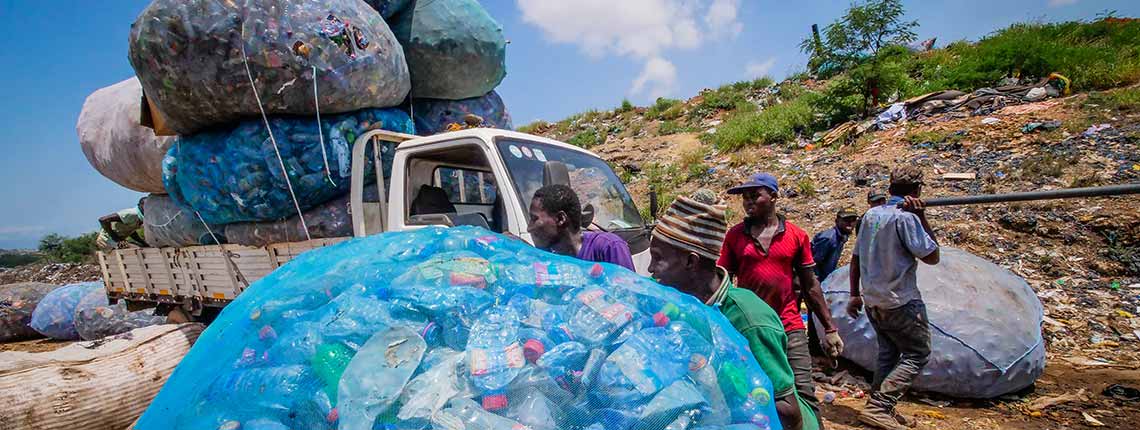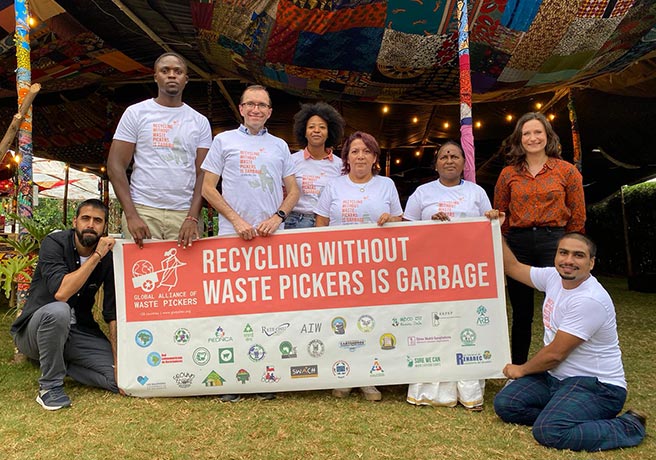“We are the face of recycling in the world, we are the hands that clean the world, we are the real heroes of the planet and nothing you try to do without recyclers is going to work.”
This was the message from waste pickers globally that Soledad Mella, representative of the Global Alliance of Waste Pickers and president of the Asociación Nacional de Recicladores de Chile (ANARCH), delivered at the fifth session of the United Nations Environment Assembly (UNEA-5.2) plenary earlier this year in Nairobi, Kenya.
Governments at UNEA-5.2 formally agreed to negotiate by 2024 a global plastics treaty, an internationally legal binding instrument designed to end plastic pollution and to establish a science-based policy panel on chemicals and waste.
Towards this goal, the first Intergovernmental Negotiations Committee meeting on plastic pollution will take place in Uruguay in November. Waste picker representatives will take their demands and perspectives to this meeting.
“With our work in plastic waste collection, sorting, aggregation, and sale for recycling, we have played a historical role in reducing plastic pollution,” the Waste Pickers and Members of the Plastics Treaty Working Group of the Global Alliance of Waste Pickers said in a submission for the Uruguay meeting. The position paper was sent to the Secretariat for the Intergovernmental Negotiations Committee (for the prospective Plastics Treaty) at the United Nations Environment Programme.
The waste pickers recommend that the negotiations include a full discussion on the “just transition” of workers in plastic production, packaging and recycling, and urge member states to dedicate time for this discussion.
A recent report estimates that waste pickers collect 58 per cent of plastics, thus contributing significantly to supplying the value chain and avoiding plastic pollution.
Waste pickers demand protection from hazardous work conditions and privatization
“We come from poor, humble and marginalized backgrounds, oppressed castes, working classes, religious and ethnic minorities, and indigenous communities,” they said in their submission. “Due to the nature of our work, we are exposed to hazardous working conditions, including exposure to air, water and soil pollution, heat and high humidity.”
As well as these working conditions, which take a “severe toll on our health,” events related to climate change make waste pickers “vulnerable to many more health risks” and loss of livelihoods and income.
Other threats to waste pickers’ livelihoods include growing privatization of waste management and waste-to-energy or incineration projects. The submission said waste pickers' jobs also were threatened because workers' considerations were not being included in public policy interventions in plastic waste management, such as the norms of Extended Producers Responsibility.
From talk to action: Recognition of waste pickers’ crucial role in waste management
Yet waste pickers remain optimistic as many governments at local and national levels have begun establishing norms mandating waste picker integration and partnership in waste management.
“We are getting contracts from municipal authorities to engage in the domain of waste management. We are being viewed as popular environment educators and organizers in the fight for environmental justice and rights,” the submission said.
Not only is the involvement of waste pickers in formulating the plastics treaty crucial, it was mandated in the UNEA-5.2 resolution, which recognized waste pickers as recyclers of plastics in informal and cooperative settings. This moment was hailed as a victory, as it was the first time that informal workers and recyclers have been mentioned in a UN environmental resolution.
The United Nations Environment Programme funded the participation of two waste pickers in the 2022 open-ended working group (OEWG) meeting in Dakar, Senegal, and has enabled waste pickers to share their views and experiences in multi-stakeholder forums.
The submission noted that demands made at the OEWG, many of which were agreed to by member states, should be reflected in the final report. These demands include financial support for at least six waste pickers from different parts of the world to take part in the plastics treaty negotiations. This is important because the nature of their work varies across regions. The submission said the secretariat must be mandated to prepare a report for meaningful participation of workers engaged in recycling in cooperative and informal settings and must mandate a report highlighting the contribution of waste pickers in reducing plastic pollution and encouraging recycling. Waste pickers should provide input into both reports, the submission said.
It also emphasized that the “just transition” discussion must include a mandate for producers to use highly recyclable materials for increasing recovery rates and to partner with the waste pickers and other workers in the informal recycling sector to implement Extended Producers Responsibility.
“Before rolling out bans on plastic materials, we request the member states to institute and implement plans for ensuring that the workers and enterprises engaged in plastic production, packaging and recycling are supported to make a transition to better livelihood opportunities,” the submission said.
“We, as waste pickers, are not averse to the technological up-gradation in waste management and recyclable material sorting; we suggest that the technological up-gradation should be done by keeping the workers in mind, in other words, technological up-gradation should mean more and safer jobs and forms of work for waste pickers and other recyclers in the informal and cooperative settings.”
Despite many barriers to the recognition of their work and other threats to their livelihoods, “we are not disheartened,” the waste pickers said. “We create work for ourselves by engaging in waste picking and recycling and try to earn a decent livelihood. Our work in recycling is contributing to a reduction in plastic pollution, lower carbon emissions and a strengthening of the circular economy.”
• Next week’s blog tells of the moment Soledad Mella took to the podium at UNEA-5.2.

